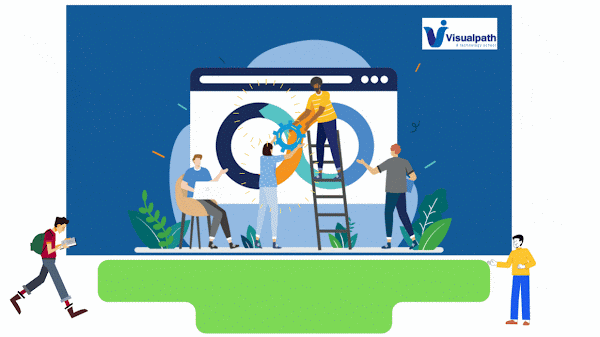Gcp DevOps : "Navigating the DevOps Landscape: A Journey Through the Stages of DevOps Lifecycle" | Visualpath
Introduction: In the ever-evolving landscape of software
development and IT operations, embracing DevOps has become imperative for
organizations seeking agility, collaboration, and continuous improvement. The
DevOps lifecycle encapsulates a series of stages that seamlessly integrate
development and operations, fostering a culture of collaboration and
efficiency. - GCP DevOps
Online Training
Planning and Development: The Foundation of DevOps The journey begins with careful planning and development. Teams collaborate to define project goals, outline requirements, and set the stage for a streamlined development process. During this phase, communication and collaboration are crucial, laying the groundwork for a cohesive DevOps culture.
Continuous Integration (CI): Merging Code Seamlessly CI is a
pivotal stage where developers merge their code changes into a shared
repository frequently. Automated tools ensure that each integration is
validated, reducing the risk of defects. CI accelerates the development process
by identifying and addressing issues early, promoting code stability. -GCP DevOps
Training in Hyderabad
Continuous Delivery (CD): Automating the Deployment Pipeline
With the foundation of CI, the DevOps lifecycle moves into CD, automating the
process of deploying code to various environments. This stage emphasizes
consistency and reliability, allowing teams to release software at any moment
with confidence. Automated testing and deployment pipelines enhance efficiency
and reduce manual errors.
Continuous Testing: Ensuring Quality Throughout Testing is
not a phase but an integral part of the entire DevOps lifecycle. Continuous
testing involves automated tests at various levels—unit, integration, and
system—to ensure the reliability and quality of the codebase. By incorporating
testing into every stage, teams can catch and address issues promptly. - GCP DevOps
Online Training Institute
Continuous Monitoring: Proactive Insights for Continuous Improvement The DevOps lifecycle includes continuous monitoring to gather insights into application performance, infrastructure, and user behavior. Monitoring tools provide real-time feedback, allowing teams to identify and address issues promptly. This stage empowers organizations to make data-driven decisions and continuously enhance their systems.
Feedback and Collaboration: Closing the Loop DevOps is not
just about tools and processes—it thrives on collaboration and feedback.
Regular retrospectives, feedback loops, and open communication channels between
development and operations teams are essential. This stage fosters a culture of
continuous learning and improvement, ensuring that lessons learned are applied
to future projects. -GCP DevOps
Training in Ameerpet
Conclusion: The DevOps lifecycle is a holistic approach to software development and IT operations, breaking down silos and fostering collaboration at every stage. By seamlessly integrating planning, development, testing, deployment, monitoring, and feedback, organizations can achieve faster release cycles, higher-quality software, and a culture of continuous improvement. Embracing the DevOps journey is not just a technical transformation but a cultural shift that paves the way for innovation and adaptability in today's dynamic business landscape.
GCP DevOps Online Training Institute - Visualpath provides
best GCP DevOps Training institute in Ameerpet classes by real-time faculty
with real time Projects. We are Providing GCP DevOps Online Training Institute
USA, UK, Canada, Dubai, Australia. Call on +91-9989971070.
whatsApp: https://www.whatsapp.com/catalog/919989971070
Visit : https://visualpath.in/devops-with-gcp-online-training.html

.jpg)


Comments
Post a Comment